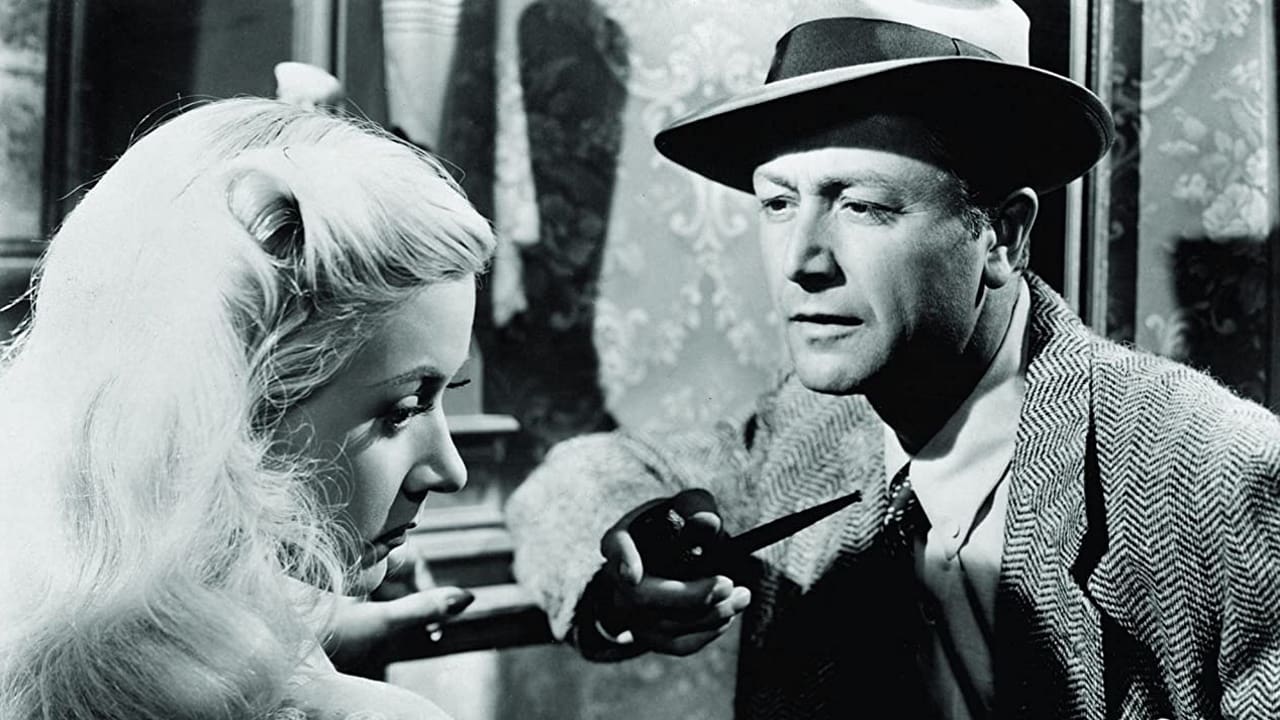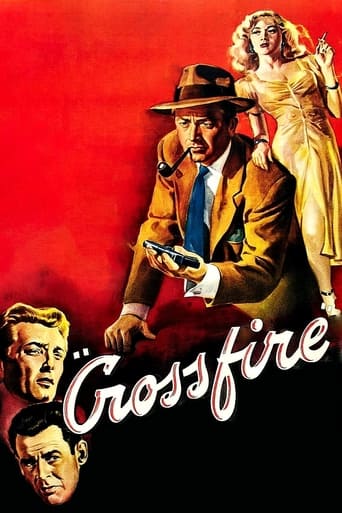

Too many fans seem to be blown away
... View MorePlease don't spend money on this.
... View MoreBrilliant and touching
... View MoreGreat story, amazing characters, superb action, enthralling cinematography. Yes, this is something I am glad I spent money on.
... View More"Crossfire" won the 1948 Edgar Award given by The Mystery Writers of America for Best Motion Picture. And at the 1947 Cannes Film Festival, "Crossfire" won the award for Best Film Dealing with Social Problems. COMMENT: Although we are never in any doubt as to the identity of the murderer, the thriller format is very effectively utilized here by director Edward Dmytryk. The excellent performances Dmytryk has drawn from his cast, plus the number and variety of striking camera set-ups, make it difficult to believe that the film was completed in only 22 days at the very moderate cost of $550,000. There is absolutely no sign of paring or budgetary constraints in the finished picture. Among the behind-the-camera technicians, J. Roy Hunt's high-contrast photography rates a special mention as it makes a major contribution to the picture's starkly noirish atmosphere. Crossfire is one of the few overt social challenge pictures of the 1940s which still holds up today. Other drum-beating movies, such as the strained and artificial Gentleman's Agreement, in which Gregory Peck, of all people, tries to persuade desk clerks, hotel managers and high society officialdom that, despite his ultra-WASPish appearance, he is actually Jewish, pale by comparison.
... View MoreCROSSFIRE is an interesting little mystery-cum-film noir production that reminded me a little of a proto RASHOMON. A man is murdered by his peers and a detective and his allies must figure out who's the killer and what exactly happened during the events leading up to the killing. They undercover a hotbed of racial hatred as the motives become clear...Edward Dmytryk's movie is well shot, well lit, and tells an interesting, unusual storyline that's a far cry from the typical film noir production involving gumshoes, femme fatales, and criminal bosses. At the same time, he employs the talent of a number of actors familiar from those films: Robert Mitchum, Robert Ryan, and Gloria Grahame can all be relied upon to give effective performances and they help to make this film an intriguing and timely viewing experience.
... View MoreYou can Insert any Class of People into the Open Ended Sentence...I hate ____. Because that is Really what the Movie is about Hate or Bigotry. The Film's Source Material was Homosexuality, the Film Inserted Jews into that Blank Above.When Robert Young's Detective gives His now Famous Speech, He says it All, even Ending with, "...once You Continue Hating, where will it Go, "...to people with striped neckties." This is a Daring and Dark Excursion, via Film-Noir into the Twisted Mind of a Hater, a Bigot that Loses Control and Murders in a Drunken Rage.There is a an Off-Kilter Ambiance to the Whole Film with Distortions and Dream-Like (drunken) Sequences Shot with Odd Lenses and Sharp Shadows and Soft, Out of Focus Scenes, and High-Contrast and Low Lighting. It Really is Film-Noir, not Only in the Look but with the Returning and Confused Soldiers Hastily Re-inserted into Public-Life, some Faring Better than Others.Paul Kelly makes an Odd Appearance as a Completely Whacked Ex-Lover of B-Girl Ginny and it is Another Example of just How out of Sync Things were at War's End. It Becomes Slightly Surreal and He and Ginny are a Civilian-Military Counterpoint to Film-Noir's Take on an Out of Orbit Society that had yet to Settle into a Superficial, but Embraced, Post-War America.It is a Powerful Film and One of the Few Noirs to get Recognition from the Academy. It didn't Win any but had Several Nominations Including, Picture, Director, Script, Robert Ryan, and Gloria Grahame.
... View MoreMany of the characters in "Crossfire" speak in a cadence that creates an almost surreal mood. Sam Levine, Paul Kelly and George Cooper all speak as though they are under the control of the same hypnotist. It could just be that the scriptwriter was unable to develop distinctly different characters, but it works well in this film, giving it a quality that has helped secure its place as a classic of film noir.The movie was based on "The Brick Foxhole", a novel by Richard Brooks. In the book the victim was black, but for various reasons, the murdered man in the film became a Jew, with anti-Semitism as the theme.Although Richard Brooks didn't write the screenplay, he later became a film director. Like John Huston with whom he worked on the script of "The Killers", he was a complete storyteller; he wrote as well as produced and directed. He made some sharp films: "Blackboard Jungle", "Elmer Gantry", "In Cold Blood" and one I like that many don't, "Lord Jim". He was also a tough dude; I once read that he sat Burt Lancaster on his backside after an argument turned physical.The story of "Crossfire", which takes place in New York just after World War Two, begins with the murder of a man, Joseph Samuels played by Sam Levene. A pipe-smoking policeman, Captain Finlay, played by Robert Young, investigates the crime. Young's performance is a precursor to the sage characters he later brought to full flower in television's "Father Knows Best" and "Marcus Welby MD".A number of soldiers were in the murdered man's apartment just prior to his slaying. Robert Ryan gave an acclaimed performance in this film as Montgomery, one of the soldiers in question. Big, sneering and manipulative, he invests the part with a nastiness that is palpable.At first, suspicion falls on another soldier, Mitchell. As part of the investigation, Captain Finlay calls in Sergeant Keeley, Robert Mitchum's character. Keeley tries to protect Mitchell, even arranging for Mitchell's wife to come to town.During a flashback, the film follows Mitchell on the night of the murder where he encounters some unusual characters including Ginny (Gloria Graham), a depressed dancehall "hostess". Eventually, he ends up at Ginny's apartment. Here he encounters a man, listed in the end credits as "The man", played by Paul Kelly; an unusual performance, his character emerges as forlorn, slightly twisted and possibly dangerous – adding another intriguing layer to this unusual story. The film ends abruptly, and conforms to conventions of the period, which allowed no crime to go unpunished. Montgomery is revealed as the murderer and although unarmed, is shot in the back by Captain Finlay in an almost matter-of-fact manner – showing that codes of conduct can change over 60 years. The budget limitations work in the film's favour with much of the story set at night to disguise the studio sets. The end result was a shadowy, claustrophobic world that was perfect for the telling of its taut tale.
... View More